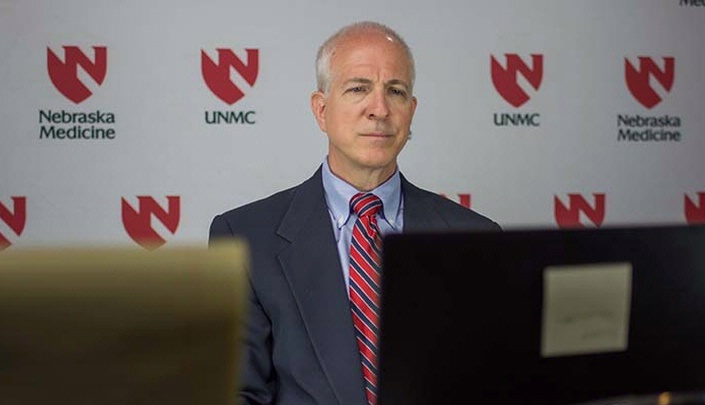Nebraska Medicine will begin offering the newly FDA-approved Eli Lilly drug known as bamlanivimab to approximately 20 patients per day, starting today. These infusions will take place at the Infusion Center at Bellevue Medical Center.
Bamlinivimab is a “monoclonal antibody treatment.” That means it’s a lab-created version of antibodies, capable of helping the body target and fight foreign infections. The drug is administered through a single IV treatment.
The drug will be given to patients who have tested positive for COVID-19 whose symptoms are mild or moderate who are also at high risk for complications from the virus. That could include, but is not limited to, those over 65 years old, those with a high body mass index (BMI), or those who have underlying medical conditions. The treatment is not designed for those who are sick enough to be hospitalized or those who are on oxygen due to COVID-19.
Because the drug is in such short supply, an algorithm was developed to identity who is most likely to benefit from this treatment among those who test positive for COVID at a Nebraska Medicine swab center or clinic. Patients will be scored based on comorbidities. Nebraska Medicine will contact the patients who qualify to offer this treatment option. Eligible patient identification criteria will be reconsidered as the supply of available medication increases.
Patients cannot request this treatment. Nebraska Medicine will be selecting the best candidates as outlined above. The call center and the COVID hotline will be using the following messaging for patients inquiring about bamlanivimab: “Due to very limited supplies, to receive the antibody treatment from Nebraska Medicine, you must have confirmed COVID-19 through testing at Nebraska Medicine. To ensure maximum patient allocation, patients to receive the monoclonal antibody preparation (Bamlanivimab) will be determined by an allocation algorithm based on a variety of risk factors such as age, body mass index, and underlying co-existing conditions. As the supply of medication increases, the requirements will be reconsidered. If you meet eligibility requirements and supply of medication allows, you will receive a phone call from Nebraska Medicine. You can find more information at NebraskaMed.com/antibody.” Personnel who receive an inquiry from a patient or someone in the community are encouraged to share that message.
While studies of bamlanivimab are promising, Mark Rupp, MD, Nebraska medical director of Infection Control and Epidemiology and chair of the UNMC Division of Infectious Diseases, said the best tools for preventing hospitalization are still the things we have been encouraged to do all along to prevent infection in the first place: wearing face coverings, washing our hands, avoiding shared indoor airspaces, and staying at least six feet away from others.
“It’s going to be months before we have an adequate supply of vaccines or an adequate supply of monoclonals,” Dr. Rupp said. “In the meantime, we need to be doing everything we can to prevent the transmission, to prevent people from getting sick and needing these medications.”
This is the first drug of its kind to be given emergency authorization from the FDA. In clinical trials, it demonstrated a statistically significant reduction in emergency room visits and hospitalizations in those who were at higher risk for complications.
